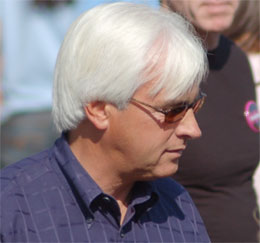- News
- Horse Racing
- Racing Preview
- AQHA Racing Challenge
- Breeding
- Sales
- Quick Stakes Results
- Detail Race Results
- Qualifiers
- Leader Board
- Leading Sires
- Videos
- Auction Leaders
- Q-Racing
Streaming Video

HOT SPRINGS, AR—JULY 15, 2020—Oaklawn Park stewards announced a 15-day suspension for Hall of Fame trainer Bob Baffert after two of his recent winners at the Hot Springs, Arkansas track failed post-race drug tests on May 2.
Following a hearing on Monday (Jul 13), the stewards announced decisions calling for a 15-day suspension of Baffert beginning Aug. 1, and the disqualification of Charlatan, who won a division of the Arkansas Derby (G1) and Gamine, a filly who won an allowance-level race on the same card. The daughter of leading sire Into Mischief followed that start with a win in the Grade 1 Longines Acorn Stakes (G1) at Belmont Park June 20.
Purse money will be redistributed and finishing positions of those horses who ran behind them will be elevated.
According to the stewards report, Charlatan and Gamine each tested positive for the local anesthetic lidocaine, specifically 3-hydroxylidocaine. When the split samples for both post-race tests came back positive July 6, an attorney for Baffert attributed the positives to environmental contamination.
Bernie Hettel, state steward at Oaklawn, said Wednesday that Baffert's lawyer stated during the hearing his intention to appeal any ruling on the two positives. An appeal would go before the Arkansas Racing Commission, whereby commissioners would consider the evidence and case and then issue a determination. Should an appeal of the commission's decision be filed, it would proceed in civil court.
Lidocaine is a recognized therapeutic that carries a withdrawal guideline of 72 hours before a race to ensure it doesn't impact racing or endanger the horse. Guidelines for the lidocaine threshold—the permitted level on race day—in Arkansas match the guidance provided by the Racing Medication and Testing Consortium: 20 picograms per milliliter in plasma or serum.
Gamine tested at 185 picograms and Charlatan at 46 picograms in their post-race tests. While Gamine was more than nine times above the threshold and Charlatan was more than twice that threshold, Robertson noted that the sport is testing at very small levels. He said the positives were caused by contamination.
Though lidocaine is used in racing, Robertson said July 6 that neither horse was administered the local anesthetic. He said both positives were caused by contamination from an employee who was wearing a Salonpas patch, which applies topical medication for pain.
"Even though lidocaine is a lawful, widely available therapeutic medication, it was never intentionally administered to either Gamine or Charlatan. When test results indicated that trace amounts of lidocaine were found in both horses after their respective races on May 2, Bob Baffert and his team were shocked. Leading up to May 2, both horses were healthy and worked hard to earn their victories that day," Robertson said. "After investigation, it is our belief that both Gamine and Charlatan were unknowingly and innocently exposed to lidocaine by one of Bob's employees.
"The employee previously broke his pelvis and had been suffering from back pain over the two days leading up to May 2. As a result, he wore a Salonpas patch on his back that he personally applied. That brand of patch contains small amounts of lidocaine. It is believed that lidocaine from that patch was innocently transferred from the employee's hands to the horses through the application of tongue ties by the employee that was handling both horses leading up to May 2."

 Newsletters
Newsletters Facebook
Facebook